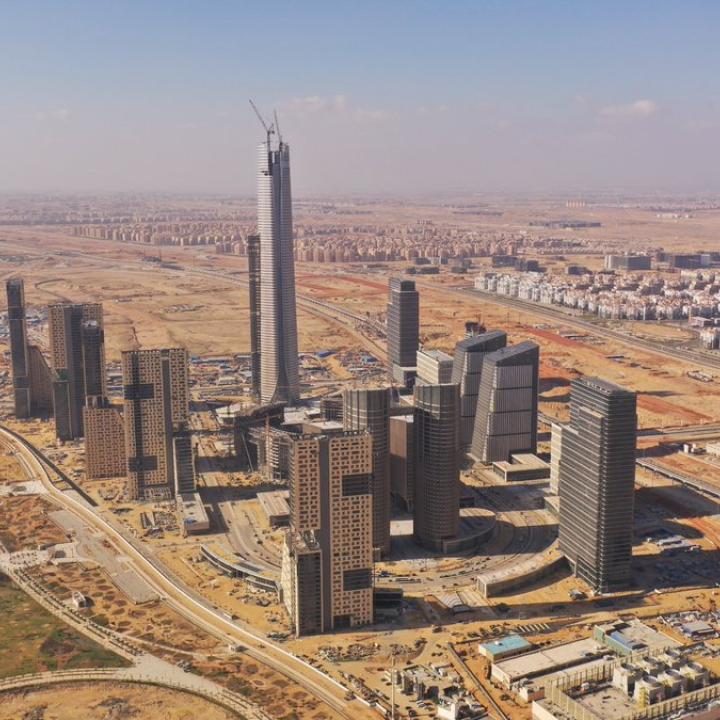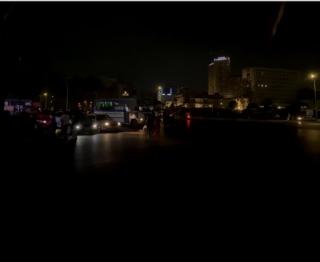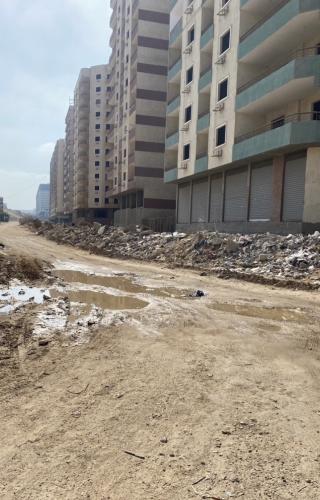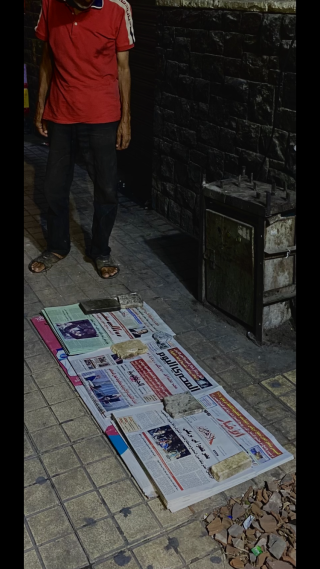
- Policy Analysis
- Fikra Forum
Egyptians Quietly Lambast Sisi’s "Accomplishments" Ahead of Elections

Regardless of the upcoming elections results, there are many Egyptians who feel that Sisi’s policies are harming their country, reflect a lack of national belonging, and are the product of reckless and poorly-considered decisions.
With elections scheduled for December 10-12, Egyptians are looking at a deeply unfair campaign for president in a race where there is little doubt of who will win the vote. Nevertheless, as it is technically election season, Sisi is running a campaign. In that campaign, he has announced that he would like to “complete the dream in a new presidential term” and that a new term will be a “continuation of our joint efforts for the benefit of Egypt and its people.”
Such an announcement also invites a look into what Sisi has "accomplished" for the country. Egyptians often discuss President Abdel Fattah al-Sisi’s so-called successes in a tone thick with sarcasm. While rarely mocking Sisi in public, in private many Egyptians cannot help but point to the sharp contrast between the government's slogans of progress and the dire economic situation on the ground. A host of critical failures on the part of the state—power outages, costly works projects, mounting foreign debt, and the collapse of the Egyptian pound—have made Sisi’s remarks tragically ironic in the eyes of many Egyptians.
For the last several months, the most obvious achievement of Sisi’s government has been widespread electricity outages. Unprecedented in modern Egyptian history, these electricity cuts leave residential neighborhoods, main streets, and central squares shrouded in darkness, with only the lights of cars and shops visible. Egyptians and tourists alike are distressed to see Egypt’s most important square, Tahrir Square, devoid of pedestrians, completely dark, and divided into traffic lanes.
In the summer, the government justified this situation by saying that the main reason for the outages is rising summer temperatures. It claimed that cutting electricity was an attempt to reduce pressure on power stations and manage daily consumption. But as Egyptians waited for electricity to be restored to its former operational schedule as summer came to a close, they were surprised to learn that authorities would be continuing the power cuts for the foreseeable future.
As average citizens now live without a reliable source of electricity, the Sisi government has squandered billions of dollars on lavish vanity projects and infrastructure that fail to address any of the longstanding issues or new daily challenges facing Egyptians. The New Administrative Capital, like the city’s recently-constructed bridges, have not resolved the traffic crisis but have exhausted a huge quantity of resources. Citizens wonder why these funds are being spent on projects that do nothing to address current living conditions, particularly in light of significant price hikes and policies that discourage the tourism upon which the Egyptian national economy depends.
In fact, in looking at a number of Sisi’s touted achievements, it is clear that there is a chasm between promises and delivery in the Egyptian state.
1. The new branch of the Suez Canal. Sisi promised to the Egyptian people that this project would bring about prosperity and end the economic crisis. Officials claimed that revenue from the canal project, to which Egyptians had contributed their own savings, would reach 100 billion USD. By May 2020, it had collected around 64 billion LE, estimated at the time to be equivalent to 10 billion USD. The government borrowed an additional 850 million USD from local banks to carry out the project. Meanwhile, the state budget was expected to shoulder an additional 7.6 billion LE per year in debt servicing for the 64 billion LE, which was collected from citizens who have little to show for it. As President Sisi attempts to justify the failed project, Egyptians sarcastically remark that “the main goal of this project was to raise Egyptian morale!”
After the canal project failed to generate revenue, a draft amendment to Law No. 30 of 1975 on the Suez Canal Authority was passed to establish a separate fund belonging to the authority. This has also stirred up anger among wide swaths of Egyptian society, civil society groups, and intellectuals. They see this as something that will enable selling or leasing the sovereign assets of the Egyptian state. Civil entities have refused to support any project that involves privatizing sections of the canal, which the Egyptian people see as symbolic of their historic struggles and sacrifices. The editor-in-chief of the al-Mesryoon newspaper called this law “dangerous,” tweeting from his official account that the government had proposed a draft law that would place the Suez Canal at the mercy of an investing fund, which would pave the way for transferring its ownership to the Sovereign Fund of Egypt. This decision would put the canal among state-owned properties that are up for sale. He observed that this law—to which the parliament has already given preliminary consent—would enable selling, buying, renting, and leasing utilized movable and immovable assets and would quickly lead to ruin.
2. The New Administrative Capital. Construction of the massive new city has saddled the Egyptian state with debts to China and consumed its foreign exchange reserves. The New Administrative Capital is located in the remote area of desert about 45 kilometers away from central Cairo, making it incredibly difficult to reach. Its inaccessibility, coupled with the ongoing economic downturn, make moving to the city unappealing or financially impossible. The city could quickly become nothing more than a ghost town in middle of the desert.
The huge, precarious towers in the middle of the desert will include the new Iconic Tower, which will be the highest skyscraper in Africa at 385 meters high. Despite its grandeur, people cannot help but wondering which Egyptians could possibly afford to live in these skyscrapers.
In October 2017, the Egyptian government signed a 3 billion USD agreement with a Chinese state construction company to build up to 20 skyscrapers in the New Administrative Capital. The Egyptian government would pay for 15 percent of the project, while the rest would come from Chinese bank loans that would be paid back over a ten-year period after the construction and sale of the towers was completed. This includes the aforementioned and ridiculed Iconic Tower, of particular concern to any would-be passersby given the country’s history of building collapses when construction is rushed. According to the Minister of Housing, the first round of Chinese loans amount to about 834 million USD (of a total of 3 billion USD in funding for the project). The first round will cover the costs of design and construction for seven high-rise buildings including two administrative and five residential towers. These towers will reach 206 meters in height, with 51 floors and a total area of 600,000 square meters.
Authorities claim that the new capital will eventually house 6.5 million people as well as all the agencies, ministries, parliamentary buildings, the presidential palace, a zone for foreign embassies and international organizations, a global business hub, an international medical city, international schools and universities, and an international airport. Completing the project in 5-7 years could have preliminary costs of up to 45 billion USD, at a time when dollars are continuing to become more expensive and are disappearing from local banks and Egyptians’ savings.
One rumor currently circulating about the new capital is that certain stages of development were completed, but that projects are now on hold and cannot be completed due to the state’s inability to shoulder the costs. Since the main source of revenue for the project comes from selling the land that the capital occupies—and given the lack of sufficient income from those sales—many speculate that the government has stopped selling for a while in hopes that the price of the land will rise. Other serious obstacles remain, and it remains to be seen how the state will deal with the lack of buyers and investors due to the lack of liquidity among the Egyptians, in addition to growing debts with rising interest.
The city’s location also poses logistical issues. Many Egyptians fail to see how thousands of employees and other citizens will reach the New Administrative Capital, particularly given the major traffic issues that already plague Cairo. This commute will pose an additional burden that people will have to bear. Egyptians consider this project to have failed, and moreover see it as a primary reason for the country’s economic collapse, the state’s debt, and the depletion of foreign currency reserves (USD in particular).
3. Devaluation of the Egyptian pound and the hoarding of USD. Egyptians have been surprised by new local regulations from the Central Bank that prohibit sending U.S. dollars abroad from dollar bank accounts in Egypt. Circulating dollars within the country is also prohibited. Dollars cannot be legally sold to customers who ask for them in banks, as has happened previously, even when people need sums of money to travel abroad or to buy foreign products, plane tickets, set aside dollars as safe assets, or obtain e-visas from countries that require dollar payments from credit cards. Instead, Egyptians have to go to the black market to buy and sell dollars, which means they could run into serious penalties for breaking the law. Egyptians also wonder what they will do now that the Central Bank has recently issued other regulations setting withdrawal limits from credit cards even while outside Egypt, while also preventing people from using cards locally to pay for international products.
Since local banks cannot issue debit/credit cards to customers with dollar bank accounts, those who have deposited their money in dollars have to personally go to the bank to make transactions from their private accounts. This makes it virtually impossible to access their funds while abroad, as international branches of Egyptian banks follow the same policy.
This turn is especially jarring given the fact that Egypt has adhered to open market economic policies on these issues for decades. Egyptians are suspicious of the new government programs underway, which they say will create additional pressures as the value of local currency falls and prices continue to rise sharply. This has led people to respond to government offers to deposit their savings in U.S. dollars, without being asked any of the usual questions about where the dollars came from, and with interest rates as high as 9 percent that are paid in Egyptian pounds. The government’s eagerness for USD raises questions about the real reason behind its concessions and high interest rates. Furthermore, the National Bank of Egypt and Banque Misr (both government banks) have interest rates as high as 20 percent of the value of the bank balances in local currency that are frozen for at least three years.
The government’s bid to gobble up USD has had drastic consequences not only for individual Egyptians, but for the broader economy. The scarcity of dollars in domestic markets has, for instance, forced a number of local factories to shut down. For example, the Elaraby Group’s electric appliance factory was shut down due to an inability to import raw materials and spare parts that need to be bought with hard currency, specifically dollars. Many also fear that the dire economic situation will cause foreign companies to withdraw from the country, putting further stress on the teetering economy.
All of this relates to the recent announcement by President Sisi that Egypt will join BRICS at the beginning of 2024. Egyptians consider this to be an attempt to get out in front of the dollar’s clout rather than developing a meaningful domestic plan for economic growth. Although state media has lauded accession to BRICS as the saving grace for the nation’s economy, many regular Egyptians fear that they will have to pay the price of this failed maneuver in their daily lives. There is also concern and anger about the Sisi government’s objectives with these policies. How can it take the cash and modest savings of ordinary people who are just trying to meet their daily needs?
4. The Sovereign Fund of Egypt. There are serious concerns among the general public as to whether the state’s sovereign assets will be used for development or whether they are merely opportunistic contracts to disguise corruption. The Sovereign Fund of Egypt was established in 2018 to move unutilized state assets in the form of buildings and properties to contribute to economic development. This fund is directly tied to the president, and continues to provoke the ire of Egyptian citizens even as the government attempts to offer explanations for the Sovereign Fund’s accumulation of wealth. The people argue that this fund hides the systematic drain of sovereign assets from the Egyptian state to foreign investment companies and feel that historic downtown Cairo in particular has become the property of foreign investors.
The Sovereign Fund recently gained ownership of the old Ministry of the Interior building in downtown Cairo, and owns one hundred percent of the stocks in Misr Insurance (as per Law No. 102 of 2023) as well as the governmental complex Mogamma El Tahrir. Since it claims the latter no longer serves the public interest, the building has been opened up to investment outside the government, which people see as an invitation to business dealings without any oversight or accountability from relevant agencies.
The Minister of Planning stated at the end of 2022 that every billion Egyptian pounds that the fund spent attracts investments as much as 5.4 billion LE, and could achieve returns as high as 15 billion LE in foreign investments. The fund was established to improve the efficiency in managing state assets and to contribute to sustainable economic development in managing its funds and assets. It also sought to achieve the optimal use of these funds and assets according to international best practices and standards in order to maximize value for future generations.
In early 2023, President Sisi frequently praised the Sovereign Fund of Egypt and its role in the optimal utilization of state assets and properties, claiming that the sustainable development of these assets will maximize and safeguard returns for current and future generations. He said it was a key partner in development, especially with regard to the fund’s efforts to implement the State Ownership Policy and bolster engagement with the private sector.
The Egyptian people are not convinced by the justifications the government has given, especially given the widespread corruption, poverty, impending economic collapse, reduced buying power, and growing national debt. Egyptians also deride the term “private sector” since they realize that corruption is rampant and continues to rise, and that the “private sector” primarily consists of people siphoning wealth from the state.
5. Demolition of Historic Cairo. Throughout Old Cairo, homes, workshops, and cemeteries are under threat of destruction without prior warning. As gardens and trees disappear and neighborhoods turn into harsh and dusty urban deserts, Cairenes sarcastically refer to the havoc being wrought as “the generals’ good manners,” in reference to how the military carries out what Sisi calls “development.”
Residents recently awoke to heavy machinery and bulldozers destroying various areas of historic Cairo, including cemeteries in the Imam al-Shafi‘i area. Other historic tombs that hold the remains of leading political, cultural, artistic, and literary figures have also been demolished. “What public utility can come before heritage?” asked a professor at the Faculty of Architecture and Urban Design at Cairo University. She added that these were the tombs of very important figures in Egyptian national history. There have been strong objections to this demolition from political parties including the Egyptian Social Democratic Party as well as civil society organizations and antiquities experts, all of which have been ignored. This has led to the resignation of many Egyptian experts who reject this erasure of centuries of cherished Egyptian history. The state has long turned a blind eye to city’s historic sites, which are now dilapidated from pollution and the passage of time. Now the government is moving from neglect to active destruction.
Regardless of the elections results, there are many Egyptians who feel that Sisi’s policies are harming their country, reflect a lack of national belonging, and are the product of reckless and poorly-considered decisions. As people now say: “They’ll sell us like they’re selling Egypt, bit by bit.”
But publicly, complaints are scattered and limited. Egyptians are aware that discussing Sisi’s foreign and domestic policies will lead to their arrest or forced disappearance for “undermining the stature of the state” and “spreading rumors.” Nevertheless, most Egyptians now live with disillusionment and lack of belonging. Those who carried out the revolution now find themselves completely without hope, replaced instead with increasing frustration and anger. This silent outcry is everywhere and on the verge of boiling over. The young and middle-aged are searching for opportunities to travel abroad to live dignified lives.
Meanwhile, at the First Global Congress on Population, Health, and Development, Sisi held a discussion session in which he affirmed the possibility of facilitating legal immigration to some countries with falling birth rates. In typical show of dark wit, Egyptians lament, “they sold us illusions, and now they’re selling us too.”
It is against this backdrop of economic hardship and widespread discontent that the president is campaigning on what he calls the “positive developments” that his government has achieved. In a televised speech on October 1, held in his new administrative capital, Sisi lambasted his political opponents and dismissed the dire economic situation, saying that “if the price of the nation’s progress and prosperity is to go hungry and thirsty, then let us not eat or drink.” He told Egyptians to “stand fast and transform the cruel circumstances we are going through into a gift. The harder you stand fast, the sooner [the economic crises] will pass." Even more puzzling and disturbing comments followed. Sisi went on to pose hypothetical ways in which he could destabilize the country, boasting that he could destroy Egypt with only 2 billion Egyptian pounds (30 million USD) by distributing opioids to 100,000 citizens going through “difficult circumstances.” His comments drew immediate condemnation from political rivals and international media alike, but provide real insight into the approach and care Egypt’s government has taken with its 110 million citizens.





